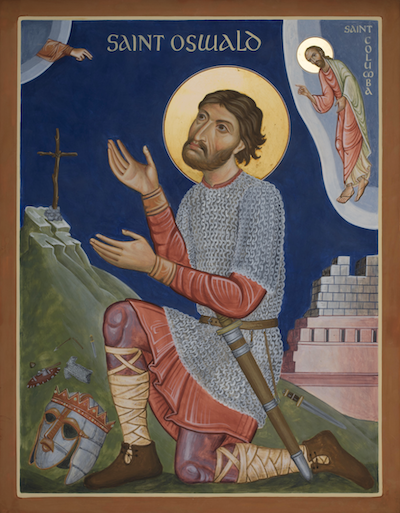by Carol Dixon
St Oswald image: © aidanharticons.com (Used with permission)
Opening words (Prayer of St Oswald- Northumbria Community Alt.)
Almighty God, when the future seems unclear help us to be faithful in prayer, trusting that at all times and in all places we are held in your hand. Give us courage and perseverance to play our part well and serve you in joy and fortitude from the beginning of our life to the end.
Hymn Awake my soul and with the sun
Awake, my soul, and with the sun
thy daily stage of duty run;
shake off dull sloth, and joyful rise
to pay thy morning sacrifice.
By influence of the light divine
let thine own light to others shine;
reflect all heaven’s propitious rays
in ardent love and cheerful praise.
Lord, I my vows to thee renew;
disperse my sins as morning dew,
grant my first springs of thought and will,
and with thyself my spirit fill.
Direct, control, suggest this day
all I design, or do, or say;
that all my powers, with all their might,
in thy sole glory may unite. [Thomas Ken]
Some thoughts on St Oswald. I first learned about St Oswald as a pupil at the Duchess’s Girls Grammar School, Alnwick where our ‘houses’ were named after Northumbrian Saints. I was in St Aidan’s where we wore blue sashes (symbolising Aidan’s journey across the sea from Iona to Lindisfarne) and my best friend was in St Oswald’s house and wore a red sash (symbolising that Oswald was a Christian martyr).
In his wonderful book Flame in my Heart about the life of St Aidan, David Adam tells the story of Oswald who became a king and then a saint. Here’s what he says: Oswald is one of the great heroes of the north. As a young child he grew up in a palace. His father, the mighty warrior Aethelfrith had united his own kingdom of Deira (Durham and North Yorkshire) with Bernicia in the north, laying the foundations of the kingdom of Northumbria, which became the mightiest military power in England. This was a time of small petty kings and regular warfare, mostly tribal skirmishes. When Oswald was 12 (around AD 616) his father was killed in battle by Raedwald of East Anglia (of Sutton Hoo treasure fame) and Oswald’s uncle Edwin became the ruler of Northumbria. Oswald and his 3 siblings were forced to flee for their lives and they escaped to the Irish Celtic kingdom of Dalriada in Argyle where the younger children received a Christian education on the Isle of Iona. Their exile lasted for 17 years during which time the young men grew up and we’re trained to be leaders of people.
Edwin was killed in a battle with the pagan Penda of Mercia and Cadwallon of Wales and the way was clear for Oswald’s eldest brother (who had married a Pictish princess) to claim back Northumbria. He met with the victors to sue for peace but was treacherously murdered so it fell to Oswald to claim their father’s kingdom. He marched south with a much smaller army than that of the enemy and the night before the battle to decide the fate of the kingdom he found himself in the field that came to be known as Heavenfield where they pitched their camp overnight. During the waiting, as he slept, Oswald had a vision of the Cross held by St Columba, the founder of Iona who announced that Oswald would be king, reminding him of God’s words to Joshua as he stood before the Promised Land. ‘Be strong and of good courage for I will be with you. You will be the leader of these people and they will occupy this land.’ Like the great Christian emperor Constantine (who won his battle after seeing the Cross) Oswald arose, confident and full of faith, and prayed that in this sign he too might overcome the enemy. A cross was quickly put together from two young, roughly hewn trees and Oswald himself bore the weight of it as his men filled in the hole it was set into then they advanced upon their enemy in the swirling mists of early morning with the cross looming large on the hill. Oswald won a great victory and set about ruling Northumbria with justice and fairness, true to his vision as a Christian leader.
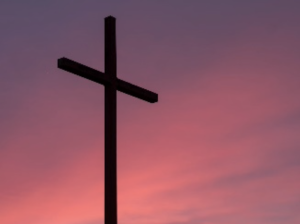
Photo Aaron Burden Unsplash
When Oswald grew up on Iona he would have been taught many of the great Celtic prayers, the best known being St Patrick ‘s breastplate, the armour of God, based on St Paul’s words in his letter to the Ephesians chapter 6. (J B Phillips translation v 10-20).
Reading Ephesians 6 10-20
10-18 In conclusion be strong—not in yourselves but in the Lord, in the power of his boundless resource. Put on God’s complete armour so that you can successfully resist all the devil’s methods of attack. For our fight is not against any physical enemy: it is against organisations and powers that are spiritual. We are up against the unseen power that controls this dark world, and spiritual agents from the very headquarters of evil. Therefore you must wear the whole armour of God that you may be able to resist evil in its day of power, and that even when you have fought to a standstill you may still stand your ground. Take your stand then with truth as your belt, righteousness your breastplate, the Gospel of peace firmly on your feet, salvation as your helmet and in your hand the sword of the Spirit, the Word of God. Above all be sure you take faith as your shield, for it can quench every burning missile the enemy hurls at you. Pray at all times with every kind of spiritual prayer, keeping alert and persistent as you pray for all Christ’s men and women.
Hymn Give me O Christ the strength that in me lies (Tune Chilton Foliat )
Give me, O Christ, the strength that in thee lies,
that I may stand in every evil hour;
my poor heart faints unless to thee it flies,
resting its weakness in thy perfect power.
Give me to see the foes that I must fight,
powers of the darkness, throned
where thou should’st reign,
read the directings of thy wrath aright,
lest, striking flesh and blood, I strike in vain.
Give me to wear the armour that can guard;
over my heart thy blood-bought righteousness,
faith for my shield, when fiery darts rain hard,
girded with truth, and shod with zeal to bless.
Give me to wield the weapon that is sure,
taking, through prayer, thy sword into my hand,
Word of thy wisdom, peaceable and pure,
so, Christ my Conqueror,
I shall conqueror stand.
Henry Child Carter (1875-1954)
© United Reformed Church in the United Kingdom
Copied from HymnQuest 2.4: Standard Version
HymnQuest ID: 53079 Used with permission
Further thoughts: When Paul wrote those amazing words he was a prisoner, awaiting a trial before the emperor and as such an important prisoner he would have been guarded day and night by a Roman soldier and he would possibly have even been chained to his guard. It’s easy to see therefore where he took the imagery from when he wrote to his friends in Ephesus who were having a difficult time.
Oswald too faced many forces of evil in his life. Despite his best efforts the country continued to be torn apart by different petty kings vying for power. As Oswald faced his biggest battle at Maserfelth in the kingdom of Mercia against the pagan King Penda 8 years after he had defeated him at Heavenfield, he knew his beloved Northumbria was in good hands. St Aidan who had come from Iona had made great inroads in sharing the Christian faith with the ordinary folk – King Oswald himself had accompanied him, translating for him until Aidan learned the local language – and the school of learning which had been set up at the king’s request on Lindisfarne was progressing well.
Oswald faced what was to be his final battle knowing he had done all he could to keep the faith and if he was to die the next day he willingly offered his life to save his Christian kingdom. I like to imagine that he spent the early hours of the morning in prayer as he had before Heavenfield and as dawn broke he committed the future to God. Perhaps he used again the prayer for protection attributed to St Patrick, (who had lived a couple of centuries before Oswald) which he had learned on Iona. This prayer, known as The Deer’s Cry leads us into our prayers.
Music: The Deer’s cry https://youtu.be/hoXUdur_-PI
Prayers of intercession (from An Australian Prayer Book)
Almighty God, your Son Jesus Christ has promised that you will hear us when we ask in faith: receive we pray, the prayers we offer for those in need in our world today.
We pray for… Christians in other countries, especially where there is suffering, danger and persecution; Strengthen your people for their witness and work in the world. Fill them with your Spirit, that they may faithfully preach the gospel. Unite in the truth all who confess your name, that we may live together in love and proclaim your glory in all the world.
We pray for… the peoples of the world and their leaders; countries in crisis; Give wisdom to those in authority in every land and give to all peoples a desire for righteousness and peace, with the will to work together to seek the common good and to share with justice the resources of the earth.
We pray for… those in need: for those who suffer; the sick; the poor; the distressed; the lonely; the unloved; the persecuted; the unemployed; those who grieve; and those who care for them…
Comfort and heal, merciful Lord, all who are in sorrow, need, sickness, or any other trouble. Give them a firm trust in your goodness; help those who minister to them; and bring us all into the joy of your salvation.
We pray for…our community: for those caring for people in need, We commend to your keeping, Father, ourselves and each other, our families, our neighbours, and our friends. Enable us by your Spirit to live in love for you and for one another and people known to us. In silence we mention them by name before you…..
We praise you Loving God for your faithful servants in every age, thinking especially today of the faithfulness of St Oswald who lived in such turbulent times yet never forgot his faith in you. We ask that we may share with him and all the saints in Christ’s resurrection glory, through his death and rising again for the salvation of the world.
Accept our prayers through Jesus Christ our Lord, who taught us to pray: Our Father…
Conclusion: Oswald was killed in the battle and his body was displayed by Penda on a tree which became known as ‘Oswald’s Tree’ – the town of Oswestry takes its name from it. His younger brother, Oswy who was also brought up on Iona, became king and Northumbria continued in the Christian faith. (Their sister Ebba became Abbess of the Abbey on the clifftop at what is now known as St Abb’s Head, in southern Scotland, then part of Northumbria). In a daring secret night raid on Mercia, Oswy collected Oswald’s mutilated body from ‘Oswald’s Tree’ and brought it home for burial on Lindisfarne. According to Bede’s History of the English Peoples, various relics were removed from his tomb and miracles were attributed to them. His head now rests inside the tomb of St Cuthbert in Durham Cathedral and he is still venerated as a saint and martyr and many churches are dedicated in his name. His example as a true warrior for Christ kept Christianity alive in Northumbria through some of its darkest days and his vision of God’s kingdom on earth is a shining example to struggling Christian communities to this day.
Our final hymn is based on an ancient Irish hymn.
Hymn Be thou my vision https://youtu.be/6CMclLT_Hjg
Closing prayer: (© Christine Sine) Let us go forth today, In the love of our Creator, In the strength of our Redeemer, In the power of our Sustainer. In the fellowship of witnesses from every tribe and nation and culture. Those who are present, those from the past, those who are yet to come. Let us go forth today, United with the Sacred Three, In harmony with the Holy One, Compassion in our hearts, Gratitude in our thoughts, Generosity in our deeds, Justice as our passion. Let us go forth today Carrying God’s image Into our hurting world. In the name of Jesus, Our Lord. Amen.
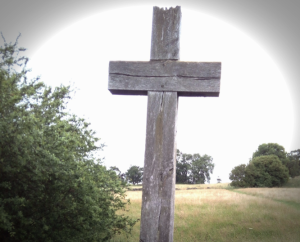
Heavenfield Cross
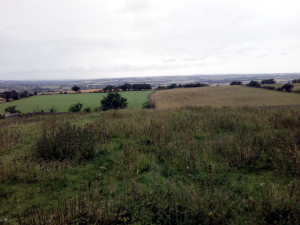
Battle field looking north
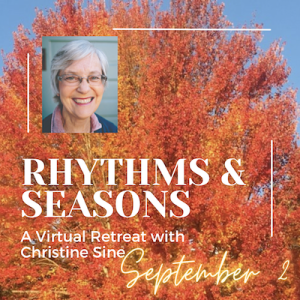

 Join Christine Sine for one or all of her three seasonal retreats: Rhythms & Seasons, A Season of Gratitude, and An Advent Quiet Day. Save the dates – September 2nd, October 14th and December 9th at 9:30-12:30.
Join Christine Sine for one or all of her three seasonal retreats: Rhythms & Seasons, A Season of Gratitude, and An Advent Quiet Day. Save the dates – September 2nd, October 14th and December 9th at 9:30-12:30.

